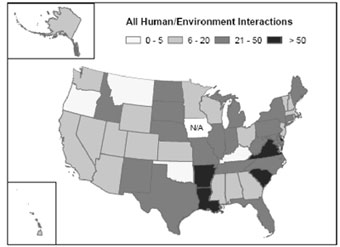Environmental education lacking in the U.S. finds new study
Environmental education lacking in the U.S. finds new study
mongabay.com
June 29, 2006
A new study found that there is a general lack of consensus when it comes to teaching students about human interaction with the environment.
Scientists at the Lamont-Doherty Earth Observatory examined 49 state science curriculum standards to assess if and how K-12 educators are directed to teach issues concerning human interactions with the Earth. They then “analyzed the standards across education divisions (elementary, middle school and high school) for mentions of the ways humans or society impacts the environment, the ways the environment impacts society or the ways individuals impact the environment.”
The researchers found more emphasis on how people and society affect the environment than on how the environment affects people and society.
“What our study shows is that there is no consensus at all across the nation about whether or not human-environment interactions should be part of science education,” said Kim Kastens, a Doherty senior research scientist at Lamont-Doherty and lead author of the study. “In some states, it’s as though you had landed in a space ship on a planet with no sentient beings or civilization. You study the air and water and rocks and plants and animals, but do not study any object or process caused by humans. In some other states, human-environment interactions are shoved into all sorts of nooks and crannies in the science standards, even when a basic science focus might be more appropriate.”
 Representation of all human/environment interactions in state science standards |
“I do think that K-12 students should study interactions between humans and the environment in school. Their generation will have to cope with serious environmental problems, and they should understand the environmental impacts of the decisions they will be making as individuals and in their careers,” added Kastens.
The research is published in a special issue of the Journal of Geoscience Education.
Related article
Environmentalism is born with exposure to nature before age 11
A new study out of Cornell University suggests that environmentalism is born in children who are exposed to nature before the age of 11. Nancy Wells, assistant professor of design and environmental analysis in the College of Human Ecology at Cornell, and Kristi Lekies, a research associate in human development at Cornell, analyzed data from a 1998 U.S. Department of Agriculture Forest Service survey that examined childhood nature experiences and adult environmentalism. The researchers sampled more than 2,000 adult Americans, ages 18 to 90, about their early childhood nature experiences and their current adult attitudes and behaviors relating to the environment.
This article is based on a release from the Lamont-Doherty Earth Observatory.